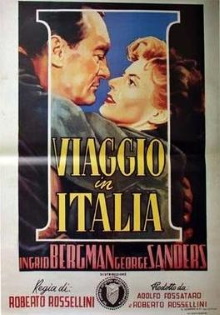Here’s another film by Roberto Rossellini and it is an Italian film despite the leads not being Italian and the dialogue in English. As befits its title, it’s a travelogue, which makes it particularly apt for watching as most of all are still barred from travel. But of course it’s really about the relationship between the couple as their frustration with each other blinds them to the incredible sights around them. This is considered a huge influential film but I don’t think it’ll be one of favorites as the psychologies of the characters involved are a little obvious and the ending feels unearned to me.
A married couple Alex and Katherine Joyce are in Italy to sell a villa in Naples that they have recently inherited. They have elected to travel by car as Katherine wanted to give Alex more of a break from work but they realize that this is the first time that they have been alone with one another since their marriage. They only end up irritating each other as Alex complains of being bored from idleness while Katherine keeps reminiscing about a now deceased former boyfriend who was a poet. When they arrive, the villa is as close to being perfect as you could expect with fantastic views of Mount Vesuvius and the sea, yet the two are too engaged with sniping at one another to really notice. As both are unwilling to give in to the other, they each have their own activities. Katherine takes tours in museums, ancient temples and catacombs while Alex goes on an excursion on the island of Capri and flirts with women there. But both are unable to find the satisfaction that they seek.
This film is absolutely amazing as a travelogue and not in a generic, commercial way either. It evokes a powerful sense of intimacy and being present in person, beginning with immersive shots of the road, the eye-level views of the scenery and the streets filled with people and going along with Katherine as she takes in all of the amazing art and ancient ruins. The fact that this is all in black and white doesn’t at all detract from the experience. The central irony of the film is of course the couple, preoccupied as they are by their relationships problems and their preconceptions, fail to be engaged by all of the beauty around them. Katherine in particular keeps thinking of the lines of poetry of her former lover and expects to find art that elevates the spirit and so is dismayed again and again to see art that is very much all about blood, sweat and tears and reminds her of base human desires. Alex pursues fantasies with other women even as he has more problems connecting and communicating with them than his own wife.
The film’s psychological depth, such as it were, is that the couple do love one another despite their disavowals and their readiness to walk away from the marriage. We can see that readily from how the thoughts of each are preoccupied by the other but they are both too proud to be first to give in. While that’s alright, it feels a little shallow to me and I do not like the last moment reconciliation at all as it feels unearned and I believe that Rossellini meant to hint at something of the miraculous in it from the Catholic procession that they are attending. I also thought that the film was too harsh on Katherine and too kind towards Alex who seemed willing to start a new relationship with a virtual stranger, being deterred only after realizing that she was already married.
On the whole, I feel that this is a solid film on a technical level and I can see how it helped inspire the French New Wave movement. But its portrayal of the feelings of the couple for each other is pretty straightforward by more modern standards. I am reminded of Antonioni’s La Notte here and its far more subtle and complex take on a couple’s dynamics but of course Antonioni acknowledges Rossellini as a forerunner and major influence to himself. This is still a fantastic film that is worth watching on its own merits but I think later films have learned from and surpassed it.
